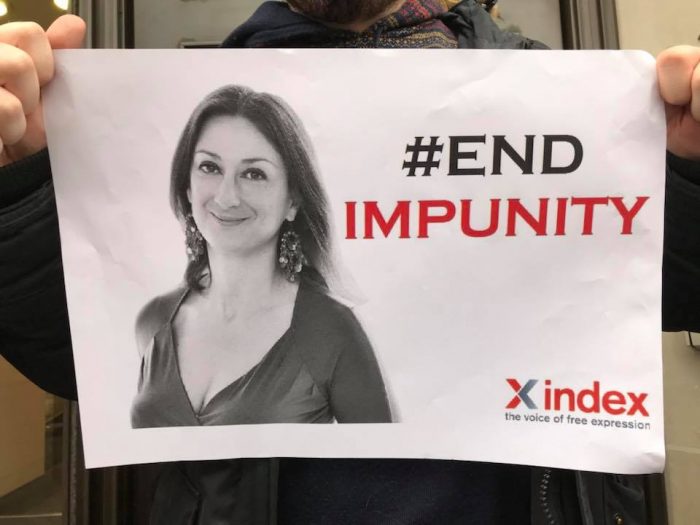16 Apr 2018 | Campaigns -- Featured, Media Freedom, media freedom featured, Statements
[vc_row][vc_column][vc_column_text]

Daphne Caruana Galizia, the Maltese investigative journalist who was assassinated in October 2017, had numerous lawsuits pending at the time of her murder.
Around the world, big business and corrupt politicians are using threats of legal action to silence journalists and other critics — including NGOs and activists.
Usually this starts with a letter threatening expensive proceedings unless online articles are rewritten or removed altogether, and demanding an agreement not to publish anything similar in the future. The letters often tell the recipient that they cannot even report the fact that they have received the letter.
This process is known as a SLAPP (Strategic Lawsuit Against Public Participation). SLAPPs are designed to intimidate and silence critics by burdening defendants with huge legal costs. The purpose of SLAPPs is not to win the case. They are vexatious and are designed to eat up time and resources. They are a way to harass and intimidate journalists and others and dissuade them from reporting.
SLAPP suits are a particular problem for independent media outlets and other small organisations. They are financially draining and can take years to process. Faced with the threat of a lengthy litigation battle and expensive legal fees, many who receive SLAPPs are simply forced into silence.
Don’t let them silence you
Index believes that by encouraging journalists and media outlets to talk more openly about these threats, we can begin to put an end to the use of these vexatious lawsuits that threaten democracy.
We support an initiative by members of the European Parliament for a new directive to tackle SLAPPs.
We also know that getting such changes takes time. But it can be done. In the United States, 34 states have enacted laws to combat SLAPPs. California, which adopted its anti-SLAPP legislation in 2009, enables defendants to sue the original plaintiff for malicious prosecution or abuse of process.
In 2015 Canada passed the Protection of Public Participation Act, which aimed to implement a fast-track review process to identify and end vexatious lawsuits.
In the meantime, there are some steps that all journalists can take to help put an end to this practice.
1. Know you are not alone
Journalists from Albania to Japan have received such letters. In Malta, for example, The Shift News website received a letter late last year from law firm Henley and Partners demanding an article be removed. Henley and Partners also stated that the letter was not to be made public.
Daphne Caruana Galizia, the Maltese investigative journalist who was assassinated in October 2017, had numerous lawsuits pending at the time of her murder. She was being sued by Pilatus Bank, a Maltese-based financial institution she frequently criticised. The lawsuit was filed in the USA and dropped following the killing.
Other Maltese media groups, faced with legal threats, have complied with Pilatus Bank’s requests, and deleted and amended articles in their online archives. Pilatus denies any wrongdoing.
In the UK, Appleby, the firm associated with the Paradise Papers, is threatening legal action against the Guardian and the BBC, demanding they disclose any of the six million Appleby documents that informed their reporting and seeking damages for the disclosure of what it says are confidential legal documents.
2. Tell others if you receive a letter
Speak to someone you trust. This could be a colleague at your place of work, your local union or a representative from a nonprofit organisation working in your country or region. Nonprofit organisations and others working in the field of journalist safety include:
Article 19
Committee to Protect Journalists
European Centre for Press and Media Freedom
European Federation of Journalists
International Press Institute
Index on Censorship
Reporters Without Borders
SEEMO
A major fear when receiving a SLAPP letter from a large law firm can be a sinking feeling that you might indeed have something wrong with your story. This casts a long shadow of self-doubt and can prevent journalists even from discussing the letters with each other within the same newsroom.
If you receive these legal threats, discuss them with journalists from other publications who are working on similar stories. This is often the only way to find out that the subject of your investigations is trying to shut down the public discussion systematically. “Discovering that pattern is not only a story in itself, but critically important in helping journalists work together to defend themselves,” says investigative reporter Matthew Caruana Galizia.
3. Report it
If you work in one of the countries covered by the project, you should report such threats to the Index on Censorship Mapping Media Freedom platform, which documents threats to media freedom. Index works with other organisations to raise the worst cases with the Council of Europe so that the council can raise cases directly with the governments concerned.
When you document these threats on Mapping Media Freedom, you help to show that they exist and are a problem for journalists and the public, who are robbed of their right to know. Once we have that documentary evidence, we can push harder for a change in legislation. We believe that the number of threats would speak for themselves, if everyone in the countries we cover reported them.
4. Know your rights
Get expert legal advice but remember that not all lawyers are the same. There are lawyers who are experienced in dealing with SLAPPs. For example, the European Centre for Press and Media Freedom has a legal team that can advise on SLAPP lawsuits and Doughty Street Chambers has an International Media Defence Panel who regularly assist journalists and NGOs faced with these kinds of threats.
Have you received a SLAPP letter? Let us know. Spreading the word about this cases is important in tackling the problem. The more we can document the extent of this issue, the easier it will be to address it. Please let us know by contacting Joy Hyvarinen, Head of Advocacy, at [email protected]. [/vc_column_text][/vc_column][/vc_row][vc_row][vc_column][vc_basic_grid post_type=”post” max_items=”12″ style=”load-more” items_per_page=”4″ element_width=”6″ grid_id=”vc_gid:1523875014232-cb75410f-355e-4″ taxonomies=”8996″][/vc_column][/vc_row]
20 Sep 2017 | Greece, News and features
[vc_row][vc_column][vc_column_text]
The European Parliament is accused of censoring a series of political cartoons from Greece which were due to appear in an upcoming exhibition later this month.
The exhibition, organised by an MEP from Greece and an MEP from France, aimed to present political and humorous sketches created by cartoonists from the two countries and published in the press on the occasion of the 60th Anniversary of the Rome Treaty. However, Catherine Bearder, a British Liberal Democrat MEP from southeast England, who is responsible for the cultural and artistic events sponsored by other members, decided to remove 12 out of 28 cartoons, all created by Greek cartoonists, claiming that the artwork contained “controversial content”.
Index on Censorship approached Bearder for comment but at the time of writing she had not replied.
According to the regulation of the European Parliament, all cultural events and exhibitions have to be checked so that “under no circumstances be offensive or of an inflammatory nature or contradictory to the values” of the EU.
The Greek MEP, Stelios Kouloglou denounced the “unprecedented” form of censorship by the European Parliament. “The content of the censored cartoons did not insult the values of the European Union in any way,” Kouloglou said in a press conference in Strasbourg on Tuesday, 12 September.
The 12 cartoons are critical of the EU and focus mainly on the way the EU – and especially Germany – dealt with the Greek crisis. One of the censored cartoons features the starting line for a race, with Germany in a Porsche sports car, Italy, Spain and France in old cars and Greece in a chariot being pulled by a pensioner.
 Breader presented the upcoming German election as another reason to discard the 12 cartoons, although the exhibition is scheduled to take place after the election.
Breader presented the upcoming German election as another reason to discard the 12 cartoons, although the exhibition is scheduled to take place after the election.
“The right for artistic creation and freedom of expression are part of the European Union’s fundamental values. This arbitrary decision violates them” Kouloglou remarked in a letter of complaint addressed to the president of the European Parliament, Antonio Tajani.
The Journalists’ Union of the Athens Daily Newspapers also denounced the incident of censorship asking for the intervention of the European and International Federation of Journalists.

Credit: Stelios Kouloglou, MEP[/vc_column_text][/vc_column][/vc_row][vc_row][vc_column][vc_basic_grid post_type=”post” max_items=”4″ element_width=”6″ grid_id=”vc_gid:1505898132982-6897be5b-fada-1″ taxonomies=”5768, 1888″][/vc_column][/vc_row]
8 Jul 2016 | Bahrain, Campaigns, Campaigns -- Featured, Middle East and North Africa, mobile
Yesterday, the European Parliament adopted, with a large majority, a resolution condemning recent human rights abuses performed by Bahraini authorities, and strongly called for an end to the ongoing repression against the country’s human rights defenders, political opposition and civil society.
Members of the European Parliament called for the immediate and unconditional release of Nabeel Rajab and other human rights defenders jailed over charges related to the exercise of their freedom of speech. They further condemned Bahraini authorities’ measures to prevent representatives of civil society from participating in the work of international bodies, such as the recent imposition of travel bans on the delegation set to attend the UN Human Rights Council in Geneva in June.
In the resolution, MEPs urged the Bahraini government to stop persecuting legitimate political opposition. They condemned the decision to suspend the country’s biggest opposition group, Al-Wefaq National Islamic Society, and called for the release of Sheikh Ali Salman, the group’s secretary general whose sentence was increased from 4 to 9 years in May.
The MEPs particularly condemned the Bahraini authorities’ misuse of anti-terrorism laws and mechanisms for denaturalisation as means of political pressure. The European Parliament strongly called on the authorities to reverse the decision to revoke the citizenship of Sheikh Isa Qassim and to “restore Bahraini citizenship to all those individuals who were unfairly stripped of it.”
The resolution also called for the effective implementation of the 2011 recommendations of the Bahrain Independent Commission of Inquiry, the Universal Periodic Review and the country’s own constitutional provisions linked to the respect for human rights and fundamental freedoms. Furthermore, the resolution recognised the risk of impending execution faced by Mohammed Ramadan and Ali Moosa.
Finally, MEPs condemned the agreements on trade in weapons and technologies used to violate human rights and called for the prohibition of exports of tear gas and anti-riot equipment to Bahrain until investigations have been carried out into their inappropriate use.
The undersigned NGOs strongly welcome the resolution as a clear signal to the Bahraini authorities that they must respect their international commitments, as well as their own constitution, and allow their citizens to exercise their basic rights and freedoms, such as freedom of expression and assembly.
We believe that it is of the utmost importance that EU policy and decision-makers assert the respect for human rights and legitimate expression of political dissent as a condition for any further development of relations with Bahrain and GCC countries. The next opportunity to do so will be the EU-GCC ministerial meeting which will be held in Brussels on 19 July 2016.
Please read the full text of the resolution here.
Background:
In what has been a concerted crackdown on civil society, media and fundamental freedoms, Bahraini authorities have in the past month embarked on a series of arrests, impositions of travel bans and denaturalisations of their citizens who have tried to exercise their fundamental freedoms, including the freedom of expression and freedom of assembly.
These moves include:
- the arrest and prosecution of the prominent human rights defender Nabeel Rajab;
- the suspension, announced dissolution and the asset-freeze of the country’s biggest opposition party, the Al-Wefaq Islamic Society;
- an increased jail sentence, from 4 to 9 years, for the party’s Secretary-General, Sheikh Ali Salman;
- the imposition of travel bans on journalists and activists, including a delegation of human rights activists set to participate at the 32nd UN Human Rights Council session in Geneva;
- the forced exile of prominent human rights activist Zainab al-Khawaja;
- the suspension of several non-governmental and religious organisations;
- the denationalisation of Sheikh Isa Qassim, the spiritual leader of the Bahrain’s Shia majority population
These moves, and in particular the decision to revoke the citizenship of Sheikh Isa Qassim, provoked a wave of mass protests across the country, representing the largest public outcry since the 2011 unrest.
Signed By
Americans for Democracy & Human Rights in Bahrain
Bahrain Center for Human Rights
Bahrain Institute for Rights and Democracy
English Pen
European Centre For Democracy and Human Rights
Index on Censorship
International Federation for Human Rights
Justice Human Rights Organization
Pen International
Reprieve
7 Oct 2015 | Africa, Angola, Campaigns, mobile, Statements
The resolution calls for the release of all political prisoners and human rights defenders and highlights the case of José Marcos Mavungo, at that time on trial in Cabinda province for the crime of rebellion. Mr. Mavungo was organising a peaceful protest, but the government alleges he was involved with the handling of explosives and leaflets along with other individuals. Despite providing no evidence at trial to connect him with the persons or explosives, and that these men with explosives whom Mr. Mavungo is accused of associating with were not brought to trial, he was convicted and sentenced to six years in prison and to the payment of 50 000 Kwanzas legal fees (approx. US$400) on 14 September. Amnesty International considers him to be a prisoner of conscience.
The resolution further notes the increasing shrinking space for freedoms of expression, assembly and association through arrests, instrumentalisation of the judiciary system to repress dissent by criminally prosecuting individuals for exercising these rights, and the use of violence by security forces to repress peaceful public gatherings. All of these concerns have been documented many times by human rights, civil society and other organisations from within Angola and elsewhere in Africa as well as internationally.
The EP resolution also calls for action from the European Union (EU) and its member states to deliver on their commitments to support and protect human rights defenders worldwide through concrete and visible measures.
In a vote of 550 in favor, with 14 opposed and 60 abstentions, a strong statement regarding these escalations became part of the official parliamentary record.
We, the undersigned national and international organisations, strongly support the resolution by the European Parliament on the Human Rights Situation in Angola. We believe that this resolution underlines the urgent need for action in response to the escalating human rights violations in Angola.
It will be crucial for the EU, its member states and other international actors to provide timely political and material support to Angolan human rights defenders, their lawyers and families and to engage the Angolan authorities on human rights at all levels of relations, including all political, trade and development relations.
We urge the Angolan government to fully implement the measures called for in the resolution including by ending continuing human rights violations, immediately releasing all detained political prisoners, respecting the rights of citizens to enjoy their rights to freedom of expression and assembly, and engaging positively in dialogue with the European Parliament about the very serious human rights issues detailed in the resolution.
The organisations are (in alphabetical order):
Amnesty International
Angola-Roundtable of German Non-Governmental Organizations
Front Line Defenders
Index on Censorship
International Press Institute
International Service for Human Rights
Liberdade Já
OMUNGA
Organização Humanitária Internacional
PEN American Center
Robert F. Kennedy Human Rights
Southern Africa Litigation Centre
Transparência e Integridade, Associação Cívica
Transparency International
World Organisation Against Torture



 Breader presented the upcoming German election as another reason to discard the 12 cartoons, although the exhibition is scheduled to take place after the election.
Breader presented the upcoming German election as another reason to discard the 12 cartoons, although the exhibition is scheduled to take place after the election.